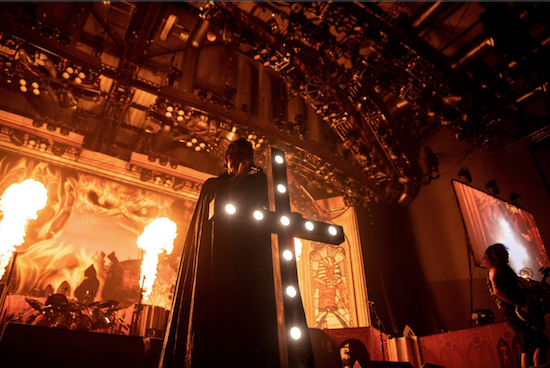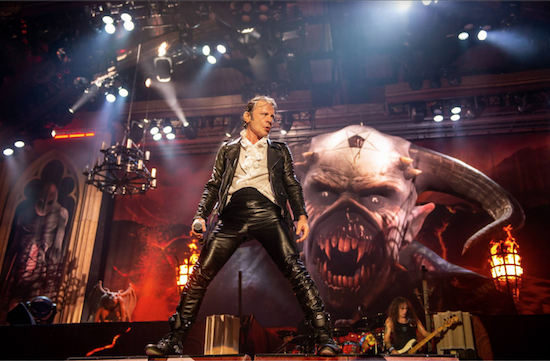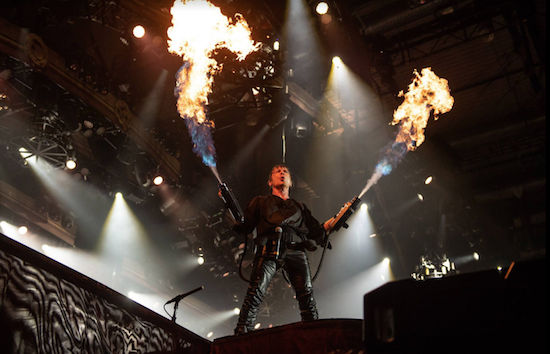War – what is it indirectly good for? The answer, for the first five songs tonight at least, is inspiring an eye-popping stage show that will be talked about for years. The Legacy of the Beast – like a post-postmodernist Lichtenstein – brings the arcane world of the Boy’s Own comic to life. There can be few more exciting visions to behold than Bruce Dickinson running at full pelt and leaping over a prefab grassy mound as a giant Spitfire hovers overhead during opener ‘Ace’s High’. Dressed like a sexy Biggles in leather chaps and flying helmet, and in the best wailing form of his life, it’s fair to say he and the band are in indefatigable mood, and he looks and sounds like a man who has made a full recovery from serious illness. But more on that in a moment.
Bruce Dickinson, all 5 ft 5 of sinew and tough stuff, has just celebrated his 60th birthday. He’s the “baby of the band” he says, before pointing out that many of the Spitfire pilots who sacrificed their lives fighting the Nazis during World War II would have only lived one third of his lifespan so far. There’s remembrance, a warning from history, and the regular rough and tumble you get with a full throttle Iron Maiden performance. The band take the trenches mise-en-scene to such extremes that drummer Nicko McBrain is hidden from view under camouflage, at least until the stage set is transformed into a giant church of denominational dubiousness as they pull ‘Revelations’ out of the bag.
During the evening, with Steve Harris’ galloping bass and the rest of Maiden as dependable as ever, Dickinson gets to sword fight a 20 foot Eddie during ‘The Trooper’, turns up the campy Hammer Horror to 11 on ‘Sign Of The Cross’ and throws flames around the stage during ‘Flight Of Icarus’. There’s also some rousing Churchill at the top of the gig, turning the 20,000 capacity arena – that makes Gatwick Airport look like le Bon Marché in Paris – into a huge rally against the dark forces that surround us. Iron Maiden are lords of a subculture where their passionate followers all drink Trooper, play the Legacy Of The Beast game (advertised on the big screens prior to the show) and have got the T-shirts. It’s a similar devotion football fans have for their chosen team of life.
Maiden, despite selling over 100 million records worldwide, like to play up to their outsider credentials: they are L’Étranger In A Strange Land if you like. Despite this phenomenal success, they have, until recent years, been sneered at critically and held at arm’s length by TV and radio. This has set up a kind of siege mentality amongst fans, and the rousing Churchill speeches and the bulldog spirit – especially in these most Brexity of times – plays into that us-against-the-world aesthetic. Ironically the rest of the world embraces them and can barely wait for Ed Force One to pay them a visit between tours. Even the most piffling advance CD single promo popped onto eBay will get snapped up for a month’s wages by a Chilean farmer dedicated to collecting rare memorabilia from the Irons. Or so I’m told. Iron Maiden are underdogs as big as Neapolitan mastiffs.
This triumph-over-adversity narrative was put to the test recently when their vocalist became seriously ill. With a “golf ball” sized cancerous growth in his tongue, Dickinson underwent radiotherapy and – despite irrevocably zapping his sweet tooth in the process – came out the other side. “Shit, it’s a fucking great result just to be alive to be honest with you”, he told Kerrang! last year (reported by NME). While getting the proper all clear normally takes five years, Bruce is cancer free at the moment, and it should go without saying that long may that happy situation continue.

Dickinson praised his “brilliant” doctor, and revealed that on receiving his diagnosis he thought to himself: “Let’s just get stuck into things as quickly as possible and if it doesn’t work out then I’ll have to make another plan.” The collective media, which likes to lay on war metaphors wherever it can when dealing with cancer, has clearly relished observing the swashbuckling hero overcome his inner cell-dividing demons. While Bruce’s gameplan sounded far more pragmatic than pugnacious, to read the press, or message boards, or Twitter, is to behold a triumph of will over an enemy that never stood a chance against somebody so distinguished. Bruce flies, he fences, he sings with the power of Pavarotti and he even finds the time to write a book now and then. Bruce Almighty is the living embodiment of the ubermensch and so it is stands to reason that cancer would be vanquished in a heartbeat. I must stress these are not claims the singer has ever made himself, but he’s had plenty of people on the internet only too happy to make such claims for him.
“Bruce Dickinson, fresh from whooping cancer’s ass, will be flying us to [Mexico] in the new, improved and fucking massive Ed Force One. Fair to say, this is shaping up to be A Lovely Time,” wrote a Metal Hammer journalist in 2016, off on a jolly to Mexico City with Bruce in the cockpit. “Over his decades-long career, Dickinson has largely conquered the music industry,” wrote Billboard in 2017, “but it was his triumph over cancer that inspired the singer to finally commit his story to paper [his autobiography What Does This Button Do?]” The Irish Times meanwhile called Dickinson a “great survivor” and heavy rock website WorshipMetal.com warned: “Hey cancer! Don’t mess with Bruce Dickinson, he’ll kick your ass!”
Though the collective media seems to relish confrontation between rock star and abnormal cell growth masquerading as a singular pantomime baddy (Elvis Costello and Morrissey “battling” the big ‘C’ are just two recent examples), there was no discernible battle taking place in my perception after I was diagnosed with colorectal cancer in 2014. In fact, undergoing treatment was more about submission to the machines and the drugs and the surgeon’s scalpel if anything. Following what appeared to be a successful first operation, the following year I had to undergo a resection because of suspected metastasis in the liver. During the process I acquiesced to the advice of the doctors and oncologists, to the needles, the radiotherapy, the chemotherapy, the endless scans and the tablets and the morphine.
I dunno, maybe Bruce got up and attacked the CT scanner or the MRI machine, but in my case I just lay perfectly still, held my breath when requested, and allowed them to pour a dye into my body that enabled them to see better what was going on inside me. After one scan, where they squirted fluid into my abdominal area through the hole my temporary colostomy bag was there for, I later began involuntarily spraying water like a jet out out of my boxer shorts and down my trouser leg for what seemed like five minutes during the walk home from the hospital. Was I putting up a fight? Not really. Was it embarrassing? You bet, but it was far from an isolated incident.
I often described going through treatment as a massive pain in the arse, but never a battle. The idea there’s a collision of forces – human being vs diabolical crab – also presents some unwelcome connotations that perhaps the person saying it is unaware of, even if they mean well. Suggesting there’s a battle puts the impetus on the sufferer, and implies that victory is ultimately in their hands. That’s regardless of how aggressive the cancer is, what stage its at, whether it was caught early enough, how old the patient is, and so on.
Setting up a narrative where people win, means that those who die apparently lose. A binary world where there are only winners and losers is the product of the sort of feeble reasoning one might associate with Donald Trump. If you were being really pedantic then you could call it a draw where the host and the disease die together. The people I’ve met who’ve had to come to terms with chronic illness have never looked at it in terms so frivolous, simplistic or crass. Sure, there’s plenty of gallows humour, but to think of it in terms of triumph or failure cheapens the severity of the unwelcome experience thrust upon us. It makes champions of those who “defeat” it, with the implication that the rest can’t quite summon the strength because they of a moral turpitude.

“Punitive notions of disease have a long history, and such notions are particularly active with cancer,” wrote Susan Sontag in Illness As Metaphor in 1978. “There is the ‘fight’ or ‘crusade’ against cancer; cancer is the ‘killer’ disease; people who have cancer are ‘cancer victims.’ Ostensibly, the illness is the culprit. But it is also the cancer patient who is made culpable. Widely believed psychological theories of disease assign to the ill the ultimate responsibility both for falling ill and for getting well. And conventions of treating cancer as no mere disease but a demonic enemy make cancer not just a lethal disease but a shameful one.”
Elsewhere, Sontag wonders if the “abuse of the military metaphor may be inevitable in a capitalist society” where “it is thought foolish not to subject one’s actions to the calculus of self-interest and profitability.” Indeed, it is not enough just to have cancer these days, 40 years after Sontag wrote those words. Sufferers are now encouraged to train for triathlons, raise money for initiatives called Let’s Beat Cancer Sooner and Red Card Cancer and Give Cancer The Boot while drinking green tea that smells of piss and eating meals you can’t taste because of the stench of turmeric. Sugar is off your Christmas card list too – a fact friends who’ve never had cancer feel they’re doing you a favour warning you about, regardless of the fact the trained medical practitioners you’ve consulted all told you to eat what you want. Fail to adhere to the shiny, happy doctrinal imperatives or find yourself unable to proceed with positivity then it’s easy to start feeling like a failure on top of everything else. There’s no room for a sense of foreboding when there’s a challenge to be faced head on with cultish zeal. “My mum’s response was to be scared, horrified and somewhat fatalistic,” a friend told me, “and I don’t think any the less of her for it.”
I should make it doubly clear that none of this is Bruce’s fault of course. Seeing him playing live and being the absolute alpha male beast that he is is a miracle of modern science and long may he reign as the overlord of loudness. One suspects too that fans facing tribulations have used Dickinson’s plight as inspiration. Certainly Nicko McBrain saw what his bandmate went through and used his example to help him knock drinking on the head. But more than anything else I’ve seen written about Bruce’s cancer, it’s his own words that stick with me. “Shit, it’s a fucking great result just to be alive to be honest with you”. I feel that way too, and I hope my good fortune continues. Nothing more, nothing less, and certainly not because of some imaginary war that never took place.



